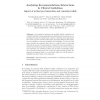Free Online Productivity Tools
i2Speak
i2Symbol
i2OCR
iTex2Img
iWeb2Print
iWeb2Shot
i2Type
iPdf2Split
iPdf2Merge
i2Bopomofo
i2Arabic
i2Style
i2Image
i2PDF
iLatex2Rtf
Sci2ools
159
click to vote
AIME
2015
Springer
2015
Springer
Analyzing Recommendations Interactions in Clinical Guidelines - Impact of Action Type Hierarchies and Causation Beliefs
Accounting for patients with multiple health conditions is a complex task that requires analysing potential interactions among recommendations meant to address each condition. Although some approaches have been proposed to address this issue, important features still require more investigation, such as (re)usability and scalability. To this end, this paper presents an approach that relies on reusable rules for detecting interactions among recommendations coming from various guidelines. It extends previously proposed models by introducing the notions of action type hierarchy and causation beliefs, and provides a systematic analysis of relevant interactions in the context of multimorbidity. Finally, the approach is assessed based on a case-study taken from the literature to highlight the added value of the approach.
| Added | 14 Apr 2016 |
| Updated | 14 Apr 2016 |
| Type | Journal |
| Year | 2015 |
| Where | AIME |
| Authors | Veruska Zamborlini, Marcos Da Silveira, Cédric Pruski, Annette ten Teije, Frank van Harmelen |
Comments (0)

